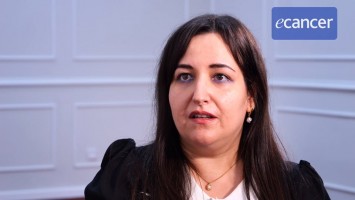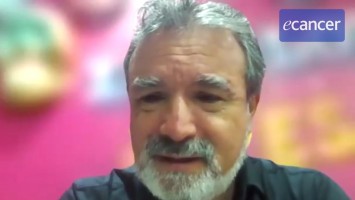ECC 2013
Observational RASTER study on the 70-gene-signature
Dr Caroline Drukker - Netherlands Cancer Institute, Amsterdam.
Hi Caroline, thanks so much for meeting with us here at the ECC. You’re here presenting data about the RASTER study but first of all maybe you can explain to me what you mean by the 70-gene-signature?
Over a decade ago the 70-gene-signature was developed at the Netherlands Cancer Institute. It’s a gene signature where you look at the 70 genes that are associated with breast cancer and the development of distant metastases and it predicts your risk of recurrence, distant recurrence. So it divides a group of patients in two, the ones with a low risk of recurrence and the ones with a high risk of recurrence.
And so what was the aim of this study then?
The primary aim was to see if it was feasible to have 70-gene-signatures performed in community based hospitals in the Netherlands. So patients were not randomised, it was just an observational trial but this was the first study where we provided patients with a 70-gene-signature result at the time of the surgery so they knew their 70-gene-signature results when they were deciding, together with their doctors, whether or not they would be treated with adjuvant chemotherapy.
And you were comparing the 70-gene-signature with Dutch guidelines, weren’t you?
Yes, we wanted to place the results in the Dutch context to see what the difference would be in low and high risk classifications made by the 70-gene-signature and made by the Dutch guidelines. That’s where we saw that 49% of the patients were high risk according to the 70-gene-signature but according to the current Dutch guidelines 71% were classified as high risk. So you have a difference of over 20% of patients that are now classified as high risk but wouldn’t be classified as high, would be low risk, according to the 70-gene-signature.
So put this into context for me, then, what does that mean in the real world?
That means that when you use a gene signature, like the 70-gene-signature, you’re likely to have less patients eligible for chemotherapy so less chemotherapy used in clinical practice. We saw in our patients that we had almost 100 women who had a low risk 70-gene-signature result but they were high risk according to the Dutch guidelines. Those patients decided not to have adjuvant chemotherapy and this showed an excellent survival of over 95% after five years and that was not different from the survival of patients who were low risk according to the guidelines. So that suggests that it’s safe to omit chemotherapy in patients with a low risk 70-gene-signature result. So probably we need to await the results of the MINDACT study, a large international trial where patients were randomised between treatment according to 70-gene-signature or according to Adjuvant Online, another risk estimation tool. Then we know for sure but these data suggest that a proportion of 20% of women can be spared chemotherapy.
Which can make a real difference for those people’s quality of life. So what kind of impact could this be making as of now, then?
I believe in the Netherlands the 70-gene-signature is already used in clinical practice. This will make the doctors more at ease with relying on the 70-gene-signature result and I hope they will be that much at ease that they will omit chemotherapy in those patients where they are now in doubt whether or not they will benefit from chemotherapy and if they have a low risk 70-gene-signature result they will withhold the chemotherapy in those patients.
And can this also translate to other countries around the world?
Yes, yes. We already published the results of the RASTER compared to Adjuvant Online, that was published the beginning of this year in the International Journal of Cancer and that showed similar results for other guidelines and for other risk estimation tools.
So what’s your bottom line take home message, then, for practising clinicians now?
Start using the 70-gene-signature to help you decide whether or not a patient will benefit from adjuvant chemotherapy, especially for those patients where the guidelines are not decisive at this point.








